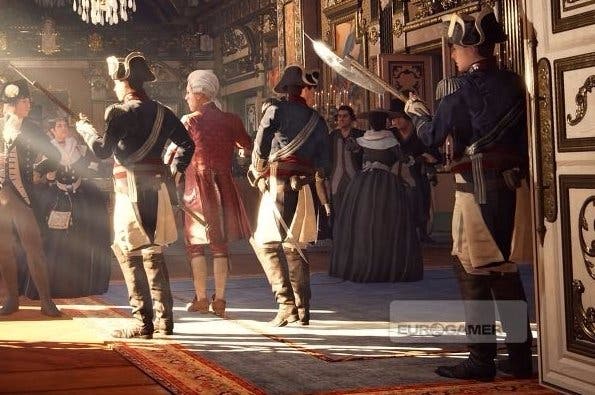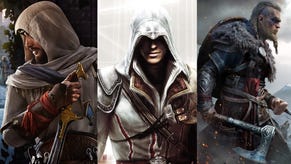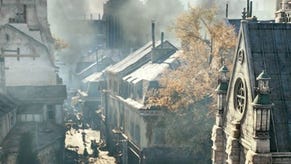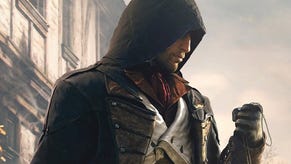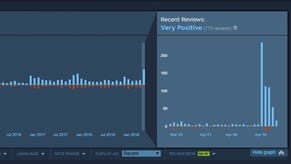Beneath Assassin's Creed Unity's bugs lurks a surprisingly human game
The 99 per cent.
There's something about playing a character whose face consists of nothing more than floating eyes and teeth that will pull you right out of your immersion. If you played Assassin's Creed Unity at launch, you'll probably know what I'm talking about, just as you'll know about highly-trained killers who like to run on the spot for no good reason and Nobles of the Robe who are apt to collapse on the floor in rubbery puddles mid-conversation, like discarded Halloween costumes. Ubisoft's swing at revolutionary Paris felt half-finished on release, less Les Miserables and more just plain miserable. I suspect a lot of Unity disks ended up as coasters as a result.
My winter was assassin-free however, so, by chance, I came to Unity fresh, long after the game had been blessed with over 300 bug fixes. Instead of gaping, skinless nobility and Benny Hill chases, I found a game that is utterly astonishing in other ways - if not quite for the reasons that games often astonish. Yes, there are lots of fabulous buildings to crawl all over in Ubisoft's condensed and hectic Paris, and there are plenty of powder-wigged heads to lop from shoulders, but none of that is a surprise. What I didn't for a second count on was finding a level of detail in the animations of the citizens of this embattled city that verges on beautiful lunacy. I didn't expect to be swept up with revolutionary zeal, either - and of a far more topical nature than anything that pertains to rich king Louis and his spoiled family.
Seriously, though: those animations. It didn't take me long before I stopped actually playing Unity in the sense of collecting things or driving the plot forward, and would find myself just standing, staring at individual Parisians who seemed to be living their lives in the virtual space around me. The streets here are filled almost to bursting with hundreds of people, protesting, demonstrating and generally revolting against the ruling nobility and church.
That said, it's not the crowds that give this game its unusual quality - it's the tiny, intricate, nuanced details of the individuals. It's the gestures of a group of men as they play cards around a table, with a different outcome for every hand that's dealt. It's the fact that every person you come across in Unity is carrying out an action of some kind, and that, the more people you watch and the longer you watch them for, the more the specifics start to stand out. Ubisoft's animators have a fanatical preoccupation with realising the most trivial aspects of each and every NPC's selfdom. Crucially, if you take people-watching to the point of stalking, eventually you will come to realise the significance of what at first appears to be an absurd squandering of art payroll and processing power.
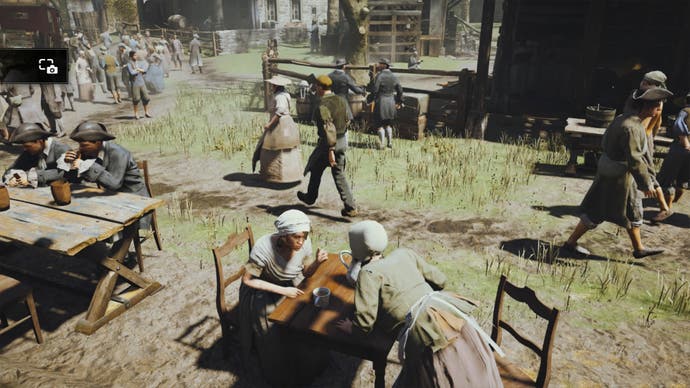
Let's hit the streets. A typical day behind the barricades. The first people I meet are two women sitting at a café table drinking coffee in the warm morning half-light. One pours and a little stream flows from the pot. Steam rises from the flow coming from the tilted pot and then from the two cups, once they've been filled. As one of the women tells a story, the other is reminded of some gossip she heard. She interrupts, blurting out her juicy scoop. It must be scandalous because the other woman bridles with indignation. But there's more: the gossiper looks behind her for any eavesdroppers and then gets up from the table, leans over and delivers a really slanderous rumour. She sits back down, rocks back in her chair, looking pleased with herself and then both feign haughty disdain over the whole affair. How many people toiled on this small scene that most players won't even encounter?
Just out of earshot of the coffee drinkers, a man sweeps the street. There are plenty of street sweepers keeping the grime from building up too quickly in the busier areas of Paris, but this man works in a quiet, tree-lined street far away from the worst of the rabble. Proximity to those trees is a bit unfortunate, really as he suffers from hay fever. He switches between sweeping, stopping to sneeze, wiping the sweat and pollen from his face and back to sweeping. Unlucky, mon ami. No matter. The streets are filled with plenty of lowly workers like him. I watch one hammering at a barrel for a while. He rarely does the same action twice, and I'm about to move on when, out of nowhere, he smashes the hammer off his thumb and I wince as he recoils from the pain. He begins to shrink down and and fold up, and then he pushes his thumb between his legs at the knees and shudders as he applies pressure.
Not everyone is hard at work, though. As afternoon comes round, Paris becomes sunny and rather jolly. I watch people dance about to a four-piece band and I watch a posh guy chatting up a lady in a fancy dress. She feigns a cough so that he will touch her arm in supposed concern. A man paints a portrait and occasionally gets up to reposition the hand of his sitter, who squirms around because his nose itches. A quiet bloke sits under some shade watching on, amused like me. He's whittling a piece of wood and I can't help but feel absolute delight when I see a lovely little curl of sawdust drop off to the floor beneath him. Not a single person I have encountered has anything whatever to do with the story or sidequests in Unity. If anything the main narrative and mechanics here are pared down and pedestrian compared to previous titles in the series. As an action-adventure, Unity is a bit of a bore. It's the people of Paris that are worth sticking around for.
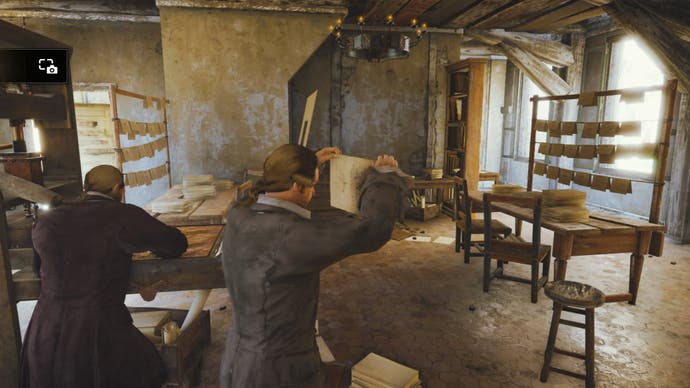
The revolution, though, is not all cafes and dancing in the sun. Walking by a protest outside the Palais de Justice, I see four men carrying the body of another between them. They are fighting for a cause - fighting and dying. I walk into the open doorway of a building and watch two men work a printing press. Pamphleteers! It takes a few minutes just to print one poster, expounding liberté, égalité, fraternité. One man carefully smears the ink onto the surface of the press before the other places the paper. They fold the press over, prime it, and pull down on a lever, giving it an extra squeeze at the end, just to make sure. Out it slides again before unfolding, and the paper man gingerly removes the latest message intended for the third estate - the common men and women of France. The printer holds the poster up with the tips of his fingers and thumbs and examines it in the light. Onto the pile it goes, while the other man cleans off the old ink, ready to start again.
I am starting to realise that this matters. To me, at least. The parallels between the atmosphere in Paris in 1790 and that of Britain, Europe and the wider world today is impossible to miss. The crowds outside Westminster right now are angry and unified, the global Occupy movement's sentiments increasingly mainstream. Non-academics are reading and arguing over Capital, an unlikely best-seller by the economist Thomas Piketty, who has become an equally unlikely celebrity, who argues that modern capitalism will never reduce the gap between the haves and the have-nots, the one per cent and the rest of us. In this way, Assassin's Creed Unity feels like an intensely political game: a superhero adventure, of sorts, but one that acknowledges that many of the world's problems cannot be solved by a superhero. The heroics, in fact, feel humdrum in comparison to the discovery that every single person you encounter is gloriously mortal, yet many of them are willing to fight for societal change, even with so little individual power.
Assassin's Creed was always seeking to be something special, but who would have thought it would attempt political rallying? It seems so far-fetched that such mass-produced entertainment could contain a theme that feels so timely, and it makes the shambles of the game's launch even more of a tragedy.
That said, the recent reveal of Assassin's Creed Syndicate suggests that the series plans to continue its political agitation. The trailer characterises London in 1868 as a time when "the working class sleepwalks through life, unaware of the machine that drives them." In Syndicate you will "wake them up" because "It must be a future for everyone." I suspect Ubisoft really means everyone, too, from the coffee drinkers gossiping in the cafes to the street sweeper, sneezing as he walks the avenues with his broom.
